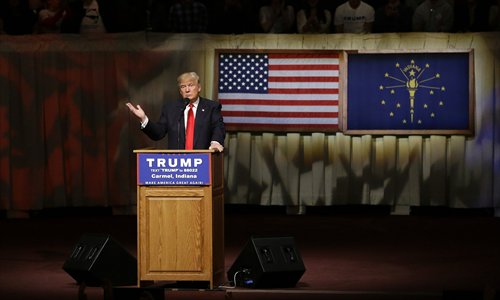HOME >> WORLD
Will Trump rumpus singe the Middle East?
By Mukesh Sharma Source:Global Times Published: 2016-5-4 22:08:01

Republican presidential candidate Donald Trump speaks during a rally at The Palladium in Carmel on Monday. Photo: IC
After stitching together a team which seems more crowdsourced than recruited, presumptive Republican nominee Donald Trump has come up with a foreign policy that is a nightmare for think-tanks and international politics wonks.
Leading figures in the Middle East have been festering over his earlier remark on stopping Muslims from entering the United States if he came to power.
Mehran Kamrava, director of the Center for International and Regional Studies (CIRS) at Georgetown University's School of Foreign Service in Qatar says, "The foreign policy team of advisors that Trump has put together has baffled Republican insiders. Team members are known to have extreme views on the Middle East."
Hitting hard at the Obama administration's perceived weakness in Libya, the Manhattan real estate tycoon has admonished current US policy on the Middle East and Syria, which keeps burning after five years of intense bloodletting.
Trump promises military intervention in the Middle East as a last resort but uses incendiary rhetoric elsewhere. He pulls no punches in criticizing Obama for not enforcing the red line the US President laid down on Syria.
His heated rhetoric and brusque manner is meant to draw more attention. Diplomats in the Middle East who follow the campaign don't think much would come of Trump's hurtling speeches. "Parading rhetoric is for the campaign season. Trump wouldn't be able to carry out his threats against the Middle East or Muslims once he gets power," says a Doha-based diplomat who wishes not to be identified.
The democratic ideals enshrined in the US Constitution go deep, making the individual subservient to the system rather than the establishment following the whims of an ambitious contender to the presidency gone berserk.
"A mature democracy like the US is not personality based. Checks and balances rein in wayward characters who in autocratic societies can get away with whatever they wish to," says the diplomat.
Kamrava believes the intransigent Trump could be lending a careless ear to his foreign policy team, but shoots off his mouth when hordes of supporters appear before him. "It is not clear to what extent Trump listens to his advisors as opposed to making up his own mind on various issues. Having ideas and views is one thing; having the freedom and maneuverability to act on them is another," says Kamrava.
In arguably the most vitriolic campaign in US electoral history, the Middle East has been pulled in by Trump as more frill than substance. Saudi billionaire Al Waleed bin Talal is ready to pull out all investments from the US if Trump tries to carry out his threat against Muslims.
But it is hard to believe Trump will even get closer to implementing his incendiary agenda. Abdullah Baabood, director of the Gulf Studies Center at Qatar University argues, "I don't believe he will be able to implement the policies he advocates for if he were to come to power the US system of checks and balances should limit the irrationality of his policies and his behavior."
With low oil prices complicating prospects of rapprochement after strains between regional powerhouse Saudi Arabia and Washington, Trump's histrionics will remain just that. Experts say the Middle East has had its share of problems and it doesn't want Trump to fan the fire.
Trump's fondness for building walls has helped raise one around him to keep away the remaining sane elements of the Republican Party. As Trumpphobia and Trumpphilia pull different ways, the former reality TV star will fail to see reality.
The author is a Doha-based journalist. penpulitzer@yahoo.com
Newspaper headline: War! Sad!
Posted in: Americas